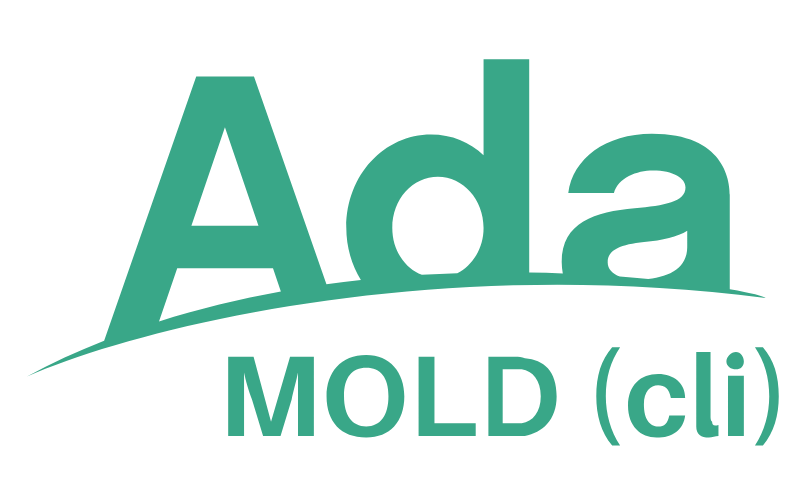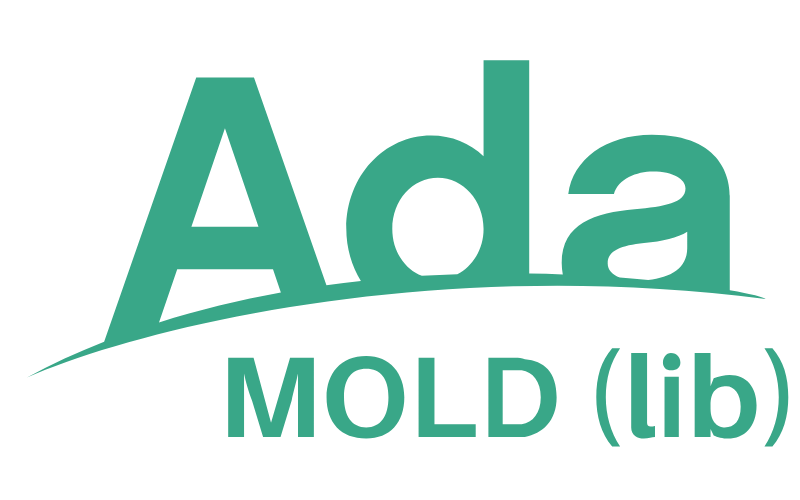USER GUIDE🔗
Command Line Tool🔗
Running mold🔗
Run mold to get more information on mold commands and common options.
mold 1.0.3 (lib-2.3.0)
USAGE
mold [global options] <command> [command options] [<arguments>]
mold help [<command>|<topic>]
ARGUMENTS
<command> Command to execute
<arguments> List of arguments for the command
GLOBAL OPTIONS
-h (--help) Display command help
--no-color Disable color
--no-tty Disable control characters
-v (--verbose) Show command activity
COMMANDS
General
help Shows help on the given command/topic
Process
apply Apply variable substitution to a file or directory
show-vars Show variables defined in a definitions file
Apply🔗
The main mold command is apply. Run mold apply -h to get more information:
SUMMARY
Apply variable substitution to a file or directory
USAGE
mold apply [options] DEFINITIONS PATH [ OUTPUT_DIRECTORY ]
OPTIONS
-f (--no-filenames) No variable substitution in filenames
-v (--no-variables) No variable substitution in variables
-d (--delete-sources) Delete source files
-o (--no-overwrite) Do not overwrite destination files
-s (--no-settings) Disable defined settings
-u (--on-undefined=ACTION) Action on undefined: ignore, warning, [error]
GLOBAL OPTIONS
-h (--help) Display command help
--no-color Disable color
--no-tty Disable control characters
-v (--verbose) Show command activity
DESCRIPTION
Apply variable substitution process to a file or directory. It requires a
definitions file and a path, either a file or directory
DEFINITIONS file is a TOML file with variables defined like 'foo="bar"'.
Multiline variables are supported. See https://toml.io for more information.
Definitions file can also contain mold settings that are applied when
enabled.
PATH is either a mold file or directory. When a directory is used, the
variable substitution process is applied to all mold files, recursively in
all subdirectories. Mold files must have the 'mold' extension. Generated
files by the process have the same name removing the 'mold' extension.
Variable substitution process is applied also to filenames.
Please visit https://rocher.github.io/mold for a complete reference.
Show Variables🔗
If you have a complex variable definition, including predefined variables, text filters, and variable substitution (variables inside other variables), it may be helpful to preview the final values of these variables before applying them to a mold file.
SUMMARY
Show variables defined in a definitions file
USAGE
mold show-vars [options] DEFINITIONS_FILE
OPTIONS
-v (--no-variables) No variable substitution in variables
GLOBAL OPTIONS
-h (--help) Display command help
--no-color Disable color
--no-tty Disable control characters
-v (--verbose) Show command activity
-d (--debug) Enable debug messages
DESCRIPTION
Show all variables defined in a definitions file once variable substitution
and filters are applied.
DEFINITIONS_FILE is a TOML file with variables defined like 'foo="bar"'.
Multiline variables are supported. See https://toml.io for more information.
Please visit https://rocher.github.io/mold for a complete reference.
Ada Library🔗
The Ada interface of mold_lib is quite simple. It consists of a unique
public package with only one function.
All the following descriptions are in the context of the Mold_Lib package:
Apply🔗
The only function call available is:
function Apply
(
Source : String := ".";
Output_Dir : String := "";
Toml_File : String := "mold.toml";
Settings : Settings_Access := null;
Filters : Filter_Access := null;
Results : Results_Access := null;
Log_Level : Log.Levels := Log.Info;
)
return Boolean;
-
Sourceis a filename or directory name. -
Output_Diris a directory name used whenSourceis a filename to create the output file in a different directory. -
Toml_Fileis the filename that contains the variables definition. -
Settingsis a pointer to aMold.Settings_Typeobject. Ifnull, the default settings are used. See section below for a complete description. -
See Custom Text Filters for more information.Filtersis an array(0..9)of pointers to functions with the signature -
Resultsis a pointer to aResults_Typeobject. If notnull, a report of all mold activity will be filled. -
Return value is
Truewhen the process finishes successfully.
Settings🔗
The Settings_Type is defined as:
type Undefined_Behaviors is (None, Warning, Error);
type Settings_Type is record
Replacement_In_Filenames : aliased Boolean;
Replacement_In_Variables : aliased Boolean;
Delete_Source_Files : aliased Boolean;
Overwrite_Destination_Files : aliased Boolean;
Enable_Defined_Settings : aliased Boolean;
On_Undefined : aliased On_Undefined_Handling;
end record;
If you specify a null pointer in the Settings parameter, then the default
settings are used, which are defined as:
Default_Settings : aliased Settings_Type :=
(
Replacement_In_Filenames => True,
Replacement_In_Variables => True,
Delete_Source_Files => False,
Overwrite_Destination_Files => True,
Enable_Defined_Settings => True,
On_Undefined => Error
);
Refer to Settings section for more information.
Results🔗
If you give a pointer to a Results_Type object as parameter in the Apply
function, detailed results are provided:
type Field_Type is
(
Files_Processed,
Files_Renamed,
Files_Overwritten,
Files_Deleted,
Variables_Defined, -- in the toml file
Variables_Found, -- in all mold files
Variables_Undefined,
Variables_Replaced,
Variables_Ignored,
Variables_Emptied,
Warnings
);
type Results_Type is array (Field_Type) of Natural;

